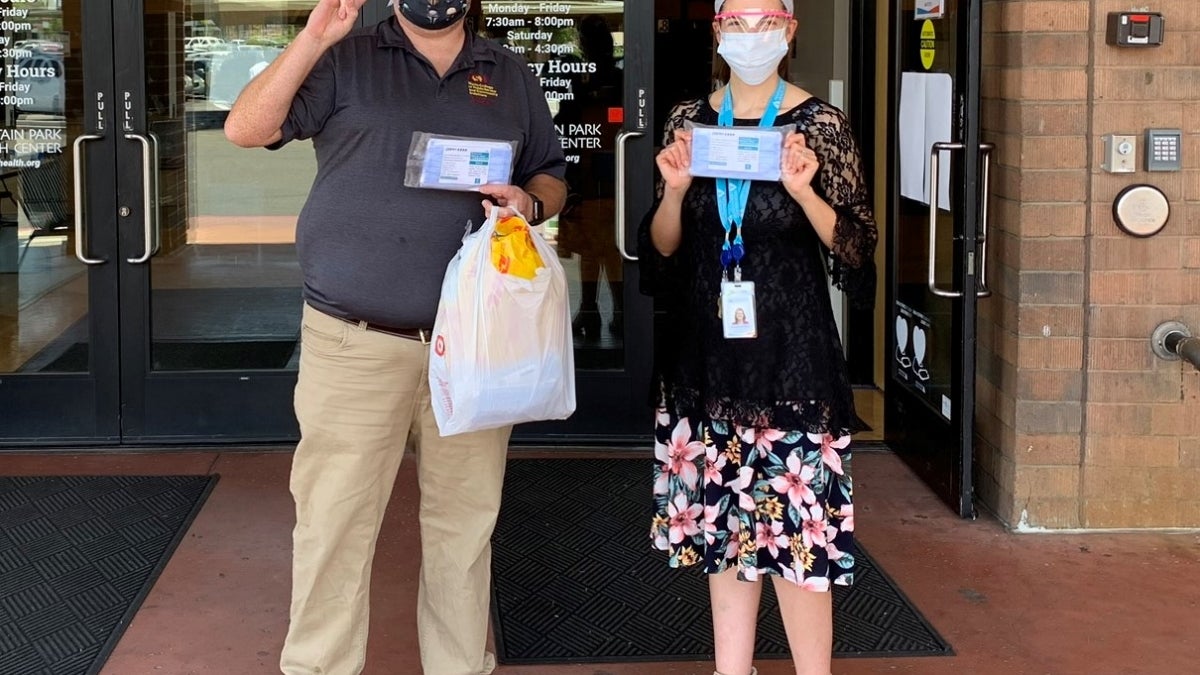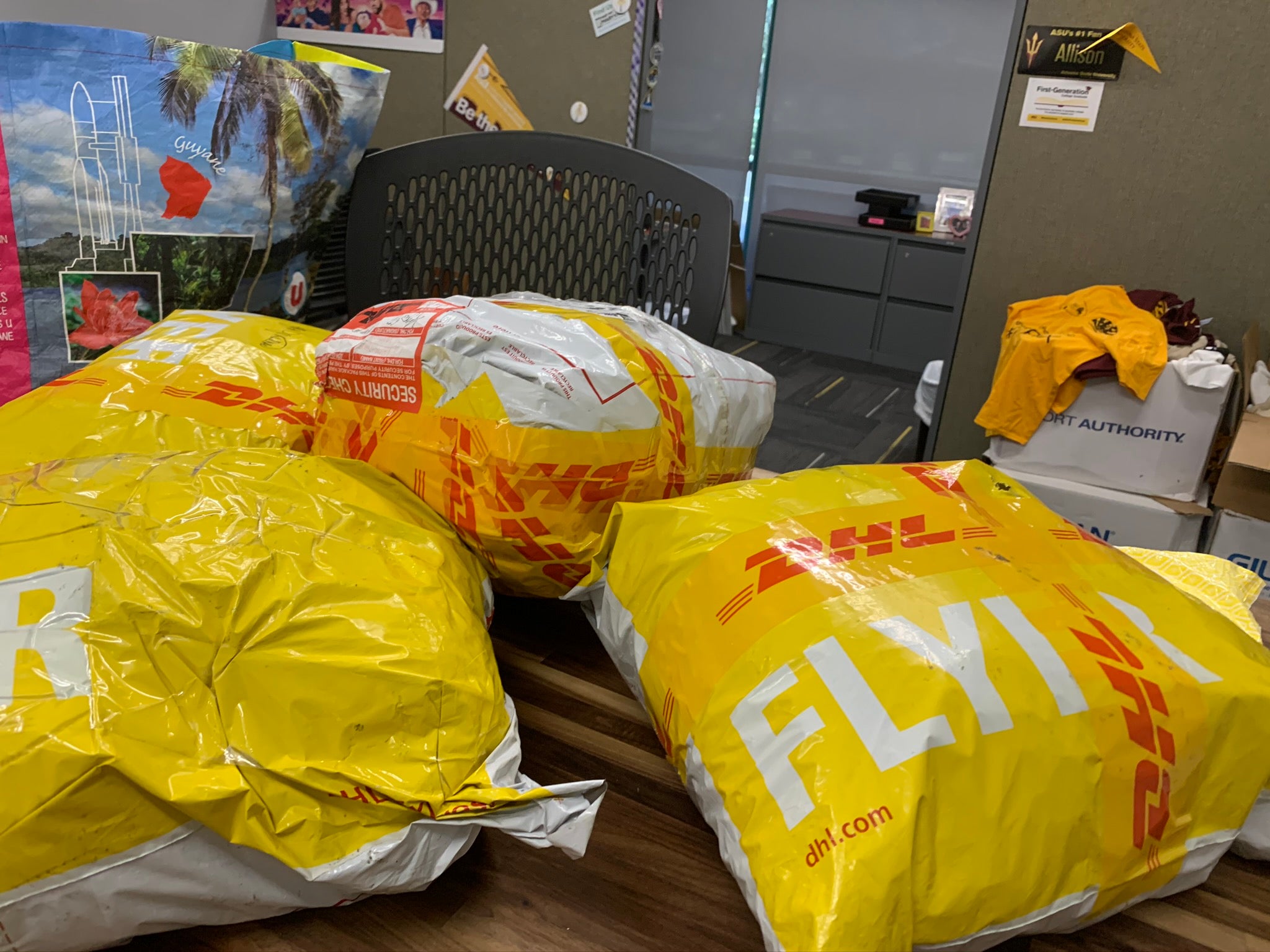Chinese university donates masks to ASU to aid COVID-19 fight

Erik Cole (left), director of the Design Studio for Community Solutions and a staff member at Mountain Park Health Center in Maryvale, one of the Watts College of Public Service and Community Solutions' community partners, displays packages of professional-grade masks donated to Arizona State University by Hainan University in China. The health center was among several recipients of the masks. Photo courtesy of ASU
Thousands of surgical masks donated to Arizona State University are helping keep people from spreading the novel coronavirus, thanks to a generous gift by Hainan University (HNU) in China. The gift is a result of a unique partnership between ASU's Watts College of Public Service and Community Solutions and Hainan University.
Observing the number of COVID-19 cases growing in the United States and in Arizona in particular, leaders at HNU wanted to do something to help their colleagues at ASU. The donation, an HNU official said, was a gesture of appreciation for the support ASU provided as the Hainan University-Arizona State University International Tourism College (HAITC) pivoted to an online teaching model when the pandemic swept across China, forcing public school closures.
Since 2017, the two institutions have jointly operated HAITC under authority granted by the Chinese Ministry of Education. In an ASU building on the Hainan campus, HAITC enrolls more than 800 students in one of three degree programs, two in tourism/recreation development and management with ASU’s School of Community Resources and Development and one in public service and public policy with ASU’s School of Public Affairs. The Haikou campus is on the island of Hainan just off the Chinese mainland between the South China Sea and the Gulf of Tonkin.
Jonathan Koppell, dean of the Watts College of Public Service and Community Solutions, spearheaded the partnership with Hainan University and celebrated the gift with Lin Wang, dean of HAITC. Wang told Koppell that HNU President Luo Qingming was grateful to ASU and the support of President Michael Crow.
Masks distributed at ASU, throughout Arizona
The masks will be used to advance ASU’s efforts to serve the community. The largest number have gone to ASU’s Biodesign Institute, where scientists have been doing research and building much-need testing capacity. The institute’s Clinical Testing Laboratory has created the first saliva-based COVID-19 test in the state, and tests using saliva rather than nasal swabs have been underway in Arizona for several weeks.
“Our researchers are dedicating themselves to long hours in our laboratories processing saliva-based tests for COVID-19, as well as working to develop a vaccine,” said Joshua LaBaer, executive director of the ASU Biodesign Institute. “We’re very grateful to Hainan University and its leadership for donating these masks, which are helping to keep our scientists, clinical staff and volunteers safe as we continue this crucial work in the lab and in the field.”
Some masks went to support testing of members of the Navajo Nation in northeastern Arizona, northwestern New Mexico and southeastern Utah. And another set of masks went to the Human Services Campus, a consortium of 16 partner organizations in downtown Phoenix providing resources and services to those experiencing homelessness in Maricopa County. Koppell is president of the Human Services Campus board of directors.
Koppell said the masks headed to various destinations connected to Watts College represents the power of the far-flung Watts College community coming together.
“What does it mean to be a community? It means that one part helps the others. That we’re all connected. This one donation visually demonstrates the power of connection — from China to the Four Corners to Maryvale to the Human Services Campus,” Koppell said. “This is what we mean when we say we’re in the business of forging community solutions.”
Donation to help those experiencing homelessness
Human Services Campus Executive Director Amy Schwabenlender said the masks have been a very welcome commodity during a time when COVID-19 cases are markedly increasing in Arizona.

Delivery bags filled with professional-grade masks donated to Arizona State University from Hainan University in China await distribution in the west Phoenix community of Maryvale. The donated masks are being supplied to multiple locations throughout Arizona, including Maryvale, the Navajo Nation and ASU's Biodesign Institute. Photo courtesy of ASU
“Generous donations, like the hundreds of items of personal protective equipment (PPE) masks from Hainan University, enable us to protect the individuals experiencing homelessness we serve as well as staff and volunteers providing that service and support,” Schwabenlender said. “At a time when the virus is far from being under control, knowing that we have the tools and resources to keep as many people safe as possible offers a tremendous level of comfort.”
A supply of masks also went to the ASU Community Collaborative at the Westward Ho, administered by the Watts College’s Center for Applied Behavioral Health Policy.
“We are super-grateful. We will be planning trainings in the fall and spring for behavioral health providers in the community who rely on ASU for workforce development,” said Natasha Mendoza, the center's director. “These masks will help us ensure that everyone is safe while becoming better equipped behavioral health professionals.”
Mendoza said ASU students engaged with the Interdisciplinary Training Academy for Integrated Substance/Opioid-Use Disorder, Prevention and Healthcare will be joining her center in person for workshops and will need to be socially distanced and masked.
“These masks will allow students to work together safely while practicing physical distancing,” Mendoza said.
More masks sent to several Maryvale locations
More masks went to the west Phoenix community of Maryvale, where Watts College has employed university resources as part of a long-range plan to enhance the area’s quality of life, managed by a partnership of the college and local residents and institutions. The effort is funded by a portion of a $30 million gift to the college in 2018 from Mike and Cindy Watts, who grew up in Maryvale and for whom the college is named.
About 1,500 masks were distributed during the week of July 20 to several Maryvale locations, including Chicanos Por La Causa’s Community Health Center, Golden Gate Community Center, Mountain Park Health, the Cartwright Elementary School District and the Estrella SuperMoms BlockWatch, said Erik Cole, director of the college’s Design Center for Community Solutions. Cole said he planned to distribute 800 more in the Maryvale area.
Watts College events coordinator Breanna Carpenter has been part of an ASU team conducting COVID-19 testing throughout the state, including on the Navajo Nation in northeastern Arizona, where she said the need for both testing and PPE is profound.
“It’s been incredible to watch everyone come together during these trying times. This donation is an example of our interconnectedness and interdependence on one another,” Carpenter said. “It’s amazing to think our partners across the globe were part of the solution that benefited our partners right here locally.”
More Health and medicine

'Incredible milestone': ASU, city of Phoenix announce location for ASU Health headquarters
Citing the need for a “new way” of doing things, Arizona State University President Michael Crow said that the headquarters for…

Have a health question? This newsletter is for you
You sprain a knee while playing basketball. Your stomach hurts all the time. You keep getting bad headaches.What’s the first…

Spring clean your social life
Spring: a season of growth, warmer weather and perhaps a case of the sniffles. But as much as the flowers are budding and…